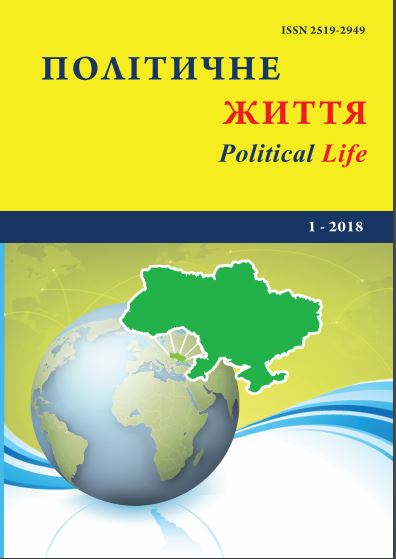Destructive informal political institutions: manifestations and mechanisms of counteraction.
DOI:
https://doi.org/10.31558/2519-2949.2018.1.14Keywords:
political institutions, informal destructive institutions, cronyism, corruption, clanism, favoritism, patron-clientelismAbstract
The article investigates the destructive kinds of informal political institutions. It identifies their main types, such as political nepotism, cronyism, favoritism, corruption, patron-clientelism, clanism and others. The author proposes a new understanding of the main types of destructive informal political institutions through the prism of neo-institutionalism methodology and analyzes the main causes of the emergence and rooting of this type of institutions. As a result of the study of the informal destructive institutionalization in the post-Soviet area, the author concludes that the subversive type of institutions is clearly expressed in the countries of Central Asia, Southern Caucasus, Ukraine, Belarus and Russia, although there are certain characteristic features of each of the countries covered by this research. The study reveals the peculiarities of the informal institutionalization of politics in countries with different levels of destructive institutions’ influence on politics: Latin American (Argentina, Brazil and Peru), Asian (mainly South-East Asian) countries, United States, and member states of the European Union. It identifies the following groups of mechanisms of counteracting the destructive institutionalization of politics: preventive (aimed at preventing the institutionalization of destructive informal political institutions); counteracting (eradication, minimization of already institutionalized informal practices in politics).
In the analysis, special attention is paid to the post-Soviet states. The article examines the manifestations of informal institutionalization in the countries of South Caucasus. It reveals the influence of subversive informal institutions on the political systems of Azerbaijan, Armenia and Georgia. The author indicates the main differences in the subversive institutions implementation in the countries of the region and defines the condition that promote or hinder the rooting of informal subversive institutions in the political system of the post-Soviet states of South Caucasus.
The article compares the informal political institutions of destructive kind in Belarus and Russia. It examines the common and distinctive characteristics of informal institutionalization in these countries. The subversive informal political institutions in Belarus and Russia demonstrate the following common characteristics: generally, the role of subversive informal political institutions is crucial in the politics of both countries; the destructive formal and informal political institutions not only are not in opposition to one other, but complement each other; neo-authoritarianism contributes to the development of informal practices in both countries; clanism exists in the management system, there are developed patron-client networks; informal client relationships dominate over the elements of civil society; the informal institutionalization manifests itself in the informal selection of candidates for offices; the elites are recruited of the basis of clientelism; the replacement of formal institutions with informal practices leads to the erosion of state institutes in both countries, weakens their resilience to various risks for the political system.
References
Губрієнко О. Особливості політико-правових змін у країнах Центрально-східної Європи (на прикладі Болгарії та Румунії). [Електронний ресурс]. ‒ Режим доступу: http://www.stattionline.org.ua/filologiya/79/13419- osoblivosti-politiko-pravovix-zmin-u-kra% D1%
Кушнарьов І. В. Політична корупція в умовах неоавторитаризму держав Центральної Азії (приклад Казахстану, Киргизстану та Таджикистану) / І. В. Кушнарьов // Вісник Дніпропетровського університету ім. Олеся Гончара. ‒ Сер. : «Філософія. Соціологія. Політологія». – 2017. – № 2. – С. 4‒16.

